“Soooo….can you still have sex?”
Since my accident thirteen years ago, I’d say this is one of the most common questions I’ve gotten from my peers — especially when I was in my twenties. Believe it or not, I was actually even asked this (in a less blunt way) by my spiritual director when we were discussing my vocation (because intercourse in a necessary part of the vocation to marriage).
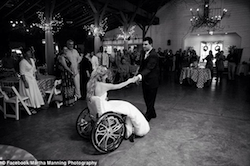 Recently, the Daily Mail caught on to the reddit comment thread of Rachelle Friedman Chapman (aka the “Paralyzed Bride“) in which she has addressed the issue of sex after a spinal cord injury several times:
Recently, the Daily Mail caught on to the reddit comment thread of Rachelle Friedman Chapman (aka the “Paralyzed Bride“) in which she has addressed the issue of sex after a spinal cord injury several times:
‘Obviously our sex life is different. There were no “logistics” before and we could be way more spontaneous,’ she wrote to a captivated audience.
‘But we totally do (have sex)!!
You can read it all here. I appreciate her candor. For those who have no experience with it, life with an SCI is a great mystery that seems devoid of any kind of pleasure or happiness. So, I think it’s important for us to be open to answering even what seem like invasive personal questions, if for no other reason than for the sake of helping people to understand that life with a disability is not as awful as it seems. That being said, I think she does get a little more, shall we say, detailed than is probably necessary.
I still like Kanae Vujicic’s response when she and her husband Nick, who was born without arms or legs, were asked the inevitable “intimacy” question on Australia’s 60 minutes. With a big smile on her face, she simply says, “He has everything he needs.” And that’s all you really need to know, folks.
It’s a little more complicated for men than women, but, yes, as I’ve said here many times, people with spinal cord injury live very “normal”, happy, active lives – lives that include the joys of love, marriage, sex…and babies.
That’s right, and babies. I can’t speak from personal experience here, of course, but I’ll never forget a friend of mine relating an exchange she had with a woman who’s first question, when told that my paralyzed friend had a daughter, was, “what agency did you get her from?” Once again, it’s more complicated for men with SCI, but us women — paraplegics and quadriplegics alike — are fully capable of getting pregnant and giving birth — naturally (See: Paralyzed and Pregnant and Paralyzed and Pregnant With Twins).
I’ve gotten some pretty invasive, blunt, stupid and border-line offensive questions from people in the past 13 years, but, in all honesty, I’d rather people ask these questions than hold back and make assumptions of their own.
Related:
Disabled People Are “Sexy,” Too!
Also recommended: The Wheelchair Mommy — for even more answers to your burning “what’s-life-like-with-an-SCI” questions?



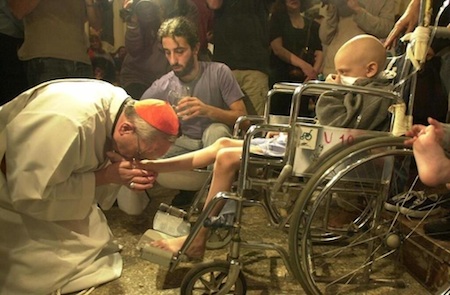
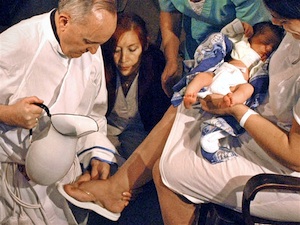


 Well, this has been a bit of an eye-opener for me. Many of you may have heard that bishops in Germany approved use of the “Morning After pill” (MAP) to treat victims of rape. Swiss bishops recently
Well, this has been a bit of an eye-opener for me. Many of you may have heard that bishops in Germany approved use of the “Morning After pill” (MAP) to treat victims of rape. Swiss bishops recently 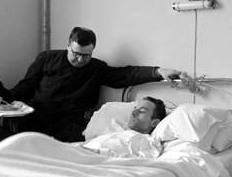 I’ve published it here a few times already, but, in light of a discussion at my local young adult Theology on Tap I thought I’d introduce (a better version of) The Apostolate of Suffering to a wider audience. So this week I published it at Ignitum Today and
I’ve published it here a few times already, but, in light of a discussion at my local young adult Theology on Tap I thought I’d introduce (a better version of) The Apostolate of Suffering to a wider audience. So this week I published it at Ignitum Today and  Recently, the
Recently, the 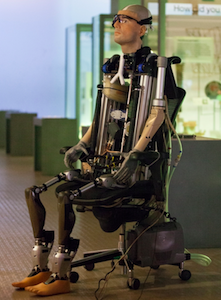 3. No doubt, when most people think of “transhumanism” they think of literally infusing the human body with all kinds of nanotechnology. In London a bionic man complete with artificial organs, synthetic blood and robotic limbs has gone on display at the Science Museum. At the Public Discourse, William Carroll talks about “Rex” and why it is impossible for any machine to be a human being.
3. No doubt, when most people think of “transhumanism” they think of literally infusing the human body with all kinds of nanotechnology. In London a bionic man complete with artificial organs, synthetic blood and robotic limbs has gone on display at the Science Museum. At the Public Discourse, William Carroll talks about “Rex” and why it is impossible for any machine to be a human being. 